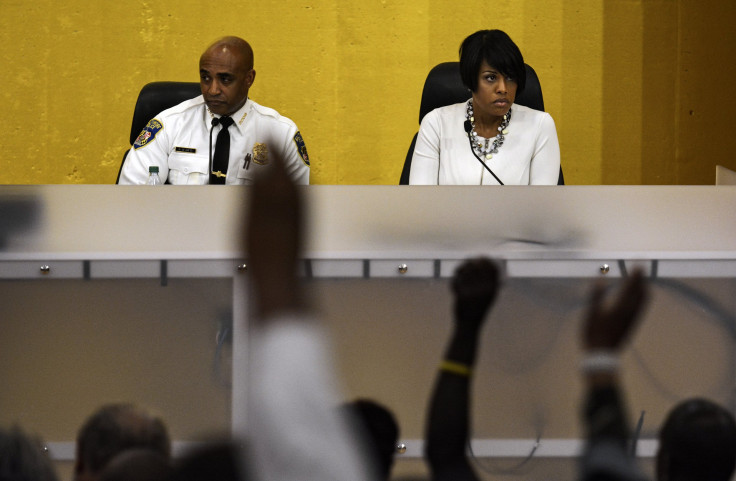Freddie Gray Police Death: 4 Reasons Why Baltimore Protesters Want More Answers

How does a well-liked, young black man arrested by police end up with a fatal injury while in custody, even though officers claim that no force was needed to detain him? Protesters and civil rights leaders continued to demand answers to that question Tuesday in the Baltimore police-involved death of 25-year-old Freddie Gray.
The young African-American man died Sunday, a week after suffering a broken vertebra following his arrest by Baltimore police officers. Police have said Gray made eye contact with an officer April 12 before he ran away and was later caught by several officers. Authorities said Gray was found to be carrying a knife.
The man was injured while being transported to a police station in a police van, police said, but the cause of his injury was unknown. Six police officers were suspended with pay Monday, pending a further investigation.
Baltimore Mayor Stephanie Rawlings-Blake has promised a quick investigation. But protesters said too much time has passed between Gray's arrest and his death, so a clear narrative of what caused Gray's fatal injury already should have emerged.
Here are four reasons why protesters were likely to continue protesting:
1. Gray, well-liked by friends and neighbors, didn't have a long rap sheet. He had some prior run-ins with police, mainly on drug charges and minor crimes, court records obtained by the Baltimore Sun revealed. But in an interview with the Sun, many of his friends and neighbors said they couldn't fathom what Gray did to suffer a severe spinal injury, seemingly at the hands of police.
2. Police records listing Gray's physique suggest that he couldn't have been a threat to police. Charging documents list Gray as 5 feet 8 inches tall and 145 pounds, the Sun reports. A friend said Gray was an avid football player as a youth. But his football aspirations ended when a high school team told Gray he was too small to be a tight end, the position he wanted to play.
3. Gray's family and protesters agree there seemed to be no reason for police to pursue him. The lawyer for the Gray's family told the Associated Press that family members believes the police had no reason at all to stop Gray. A police report of the incident described the arrest as "straightforward, with no undue force required to detain him," multiple new reports said. But family members said they believe police startled Gray prior to his being pursued.
4. A Maryland law protecting police officers' rights in conduct probes may have slowed the investigation. While Rawlings-Blake and Police Commissioner Anthony Batts have made the investigation a priority, some members of the public raised questions about the state's Law Enforcement Officers Bill of Rights. The measure allows officers up to 10 days to hire an attorney before being required to answer questions about their conduct.
The case has drawn the attention of the NAACP, which has its national headquarters in Baltimore. "This latest tragedy raises deeply troubling questions about police brutality, accountability and the excessive use of force," Cornell William Brooks, the NAACP's president and CEO, said in a statement released late Monday. "The people of Baltimore deserve answers and the NAACP will not stop until a full and thorough investigation into Mr. Gray’s death is conducted and justice is served."
© Copyright IBTimes 2024. All rights reserved.






















